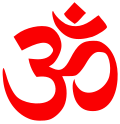
Back প্রত্যভিজ্ঞা Bengali/Bangla प्रत्यभिज्ञा दर्शन Hindi Pratyabhijñā Italian ಪ್ರತ್ಯಭಿಜ್ಞಾ Kannada Pratyabhijna Portuguese Pratyabhijna Serbo-Croatian
| Part of a series on |
| Shaivism |
|---|
 |
|
|
| Part of a series on | |
| Hindu philosophy | |
|---|---|
 | |
| Orthodox | |
|
|
|
| Heterodox | |
|
|
|
Pratyabhijñā or Pratyabhigyā[1] (Sanskrit: प्रत्यभिज्ञा, romanized: pratyabhijñā, lit. 're-cognition') is an idealistic, monistic, and theistic school of philosophy in Kashmir Shaivism which originated in the ninth century CE.[2] The name of the system is derived from its most famous work, Īśvara-pratyabhijñā-kārikā by Utpaladeva.[3] Etymologically, pratyabhijñā is formed from prati- ("re-") + abhi- ("closely") + *jñā ("to know"), so the meaning is "direct knowledge of one's self," "recognition."[4]
The central thesis of this philosophy is that everything is absolute consciousness, termed Śiva, and it is possible to "re-cognise" this fundamental reality and be freed from limitations, identified with Śiva and immersed in bliss.[5] Thus, the slave (paśu: the human condition) shakes off the fetters (pāśa) and becomes the master (pati: the divine condition).[3]
- ^ Lalla 1924, p. 111.
- ^ Olson 2007, p. 237.
- ^ a b Kapoor, p. 254.
- ^ Singh 1982, p. 117.
- ^ The Yoga of Kashmir Shaivism – S.Shankarananda, p. 45
© MMXXIII Rich X Search. We shall prevail. All rights reserved. Rich X Search